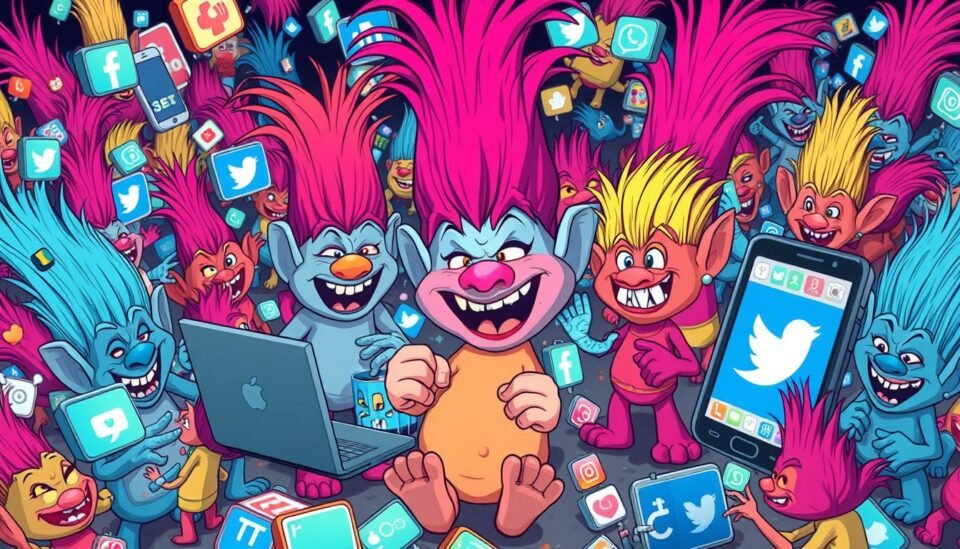Ireland has seen a worrying rise in Twitter trolls lately. These people harass and abuse others online, causing widespread concern.
This trend raises questions about its causes and effects. Let’s explore the reasons behind this troubling issue.
Key Takeaways
- The prevalence of Twitter trolls in Ireland has become a pressing social concern.
- Understanding the motivations and behaviors of these online agitators is key to addressing the problem.
- The impact of troll activity extends beyond individual victims, affecting the broader social and political landscape.
- Combating Twitter trolls requires a multi-faceted approach, involving both individual and institutional responses.
- Promoting digital literacy and responsible online engagement can contribute to a healthier online environment in Ireland.
The Rise of Twitter Trolls in Ireland
Ireland has seen a worrying increase in Twitter trolls lately. These individuals harass and abuse others online, causing significant harm.
Their actions impact the mental health of their targets. They also affect the social lives of those they harass.
Defining Twitter Trolls and Their Impact
Twitter trolls post inflammatory content to disrupt online talks. They aim to provoke strong emotions from others.
Their actions range from personal attacks to spreading fake news. Trolls often create hostile online environments.
Victims may experience anxiety and depression. Many become reluctant to engage on social media platforms.
Statistical Overview: Troll Activity in Ireland
Ireland has one of Europe’s highest rates of Irish Twitter trolls. Over 50% of Irish social media users have faced social media abuse.
Many of these incidents happen on Twitter. This data comes from the National Anti-Bullying Research Centre.
Motivation Behind Troll Behavior
The reasons behind Irish Twitter trolls‘ actions are complex. Some seek attention or power, while others act on biases.
Regardless of motives, troll activity deeply harms individuals and communities.
“The anonymity and lack of accountability on social media platforms like Twitter have only emboldened trolls, who feel free to engage in the most egregious forms of online harassment without fear of consequences.”
Addressing this issue requires action from individuals and policymakers. We must create a more respectful online space for everyone.
Key Characteristics of Twitter Trolls
Twitter trolls have unique behaviors and traits. They cause harm by disrupting talks and targeting users online.
Knowing their patterns helps fight online harassment tactics and cyberbullying patterns.
Common Behaviors and Traits
Twitter trolls often show these traits:
- Aggressive and confrontational style, using inflammatory language and personal attacks.
- Seeking attention through negative means like Twitter troll identification.
- Lack of empathy and disregard for others’ feelings.
- Manipulating platforms to spread messages and target people.
- Working with other trolls to harass users.
Types of Trolls: Political, Cultural, and Personal Attacks
Twitter trolls can be grouped by their attack focus:
- Political Trolls: They target political figures and parties. Their aim is to disrupt talks and cause division.
- Cultural Trolls: These attack minority groups and cultures. They use online harassment tactics and cyberbullying patterns.
- Personal Trolls: They focus on specific people, often celebrities. Their goal is to harm reputations or cause distress.
Understanding troll traits helps users spot and respond to them. This knowledge creates a healthier online space for everyone.
Social Media’s Role in Amplifying Trolls
Twitter trolls in Ireland thrive due to social media’s nature. Anonymity and fake accounts create a perfect storm for online harassment.
The Power of Anonymity and Fake Accounts
Hiding behind fake identities emboldens trolls on social media. They can act without fear of consequences, unleashing abuse freely.
This anonymity fuels social media algorithms, harassment, and viral misinformation. Trolls face little accountability for their actions.
Viral Spreading of Troll Content
Social media algorithms boost troll content’s reach and impact. Inflammatory posts often get more engagement, spreading viral misinformation quickly.
This viral nature helps trolls reach wider audiences. It worsens anonymous online harassment problems in Ireland.
Anonymity, fake accounts, and viral spread create a breeding ground for trolls. This environment harms individuals and communities in Ireland.
“Fake accounts and anonymity drive the troll problem on social media platforms like Twitter.”
The Consequences of Online Trolling
Social media has become a platform for online interactions. Twitter trolling is a concerning issue that comes with digital connectivity.
Trolling isn’t just a harmless online prank. It can have lasting consequences for its victims.
Cyberbullying affects emotional and mental health. It also has broader social and political ramifications.
Emotional and Mental Health Effects on Victims
Online harassment victims often experience negative emotions. These include fear, anxiety, depression, and a sense of violation.
Cyberbullying effects can lead to low self-esteem and social withdrawal. In severe cases, it can even cause suicidal thoughts.
Online harassment trauma can impact mental well-being long-term. It’s crucial to provide support for those affected.
Social and Political Ramifications
The social media impact of Twitter trolling goes beyond individual victims. It can polarize online discourse and erode healthy civic engagement.
Unchecked trolling spreads misinformation and personal attacks. This can harm social cohesion and public trust in institutions.
In politics, trolling can silence or intimidate specific groups. This undermines the principles of a free society.
| Emotional Impact | Social Impact | Political Impact |
|---|---|---|
| – Anxiety and depression – Lowered self-esteem – Social withdrawal |
– Erosion of healthy discourse – Spread of misinformation – Diminished social cohesion |
– Silencing of marginalized groups – Undermining of democratic principles – Erosion of public trust in institutions |
Online trolling has wide-reaching effects. We need a comprehensive approach to address this issue.
Understanding these impacts can help create a healthier online environment. Together, we can make the internet more inclusive for everyone.

Combating Twitter Trolls in Ireland
Twitter trolls are a big problem in Ireland. People affected can take steps to fight online harassment.
You can use smart methods and tools to defend against digital abuse.
Strategies for Individuals Affected by Trolling
- Maintain a strong sense of self-worth and resilience. Don’t let the trolls’ hateful comments diminish your self-esteem.
- Avoid engaging with trolls directly, as this can often exacerbate the situation. Instead, focus on building a supportive network of friends and allies online.
- Document and report all instances of harassment, including screenshots and records of abusive behavior. This can help build a strong case for further action.
Tools and Resources for Reporting Trolls
Many platforms offer resources to help with online harassment reporting. These tools can teach anti-trolling methods too.
- Twitter’s built-in reporting system allows you to flag abusive tweets and accounts for review and potential suspension.
- The Harassment Assistance Program (HAP) in Ireland provides free, confidential support and guidance for victims of online harassment.
- Digital self-defense workshops and educational initiatives can empower you with the knowledge and skills to protect yourself in the digital realm.
Use these tools to fight Twitter trolls. You can make your online space safe.
| Tool | Description | Key Benefits |
|---|---|---|
| Twitter Reporting | Twitter’s built-in system for reporting abusive behavior and accounts | Allows for the documentation and escalation of harassment incidents |
| Harassment Assistance Program (HAP) | Free, confidential support and guidance for victims of online harassment in Ireland | Provides emotional support, legal advice, and assistance with reporting and removal of harmful content |
| Digital Self-Defense Workshops | Educational initiatives that teach online safety and anti-trolling techniques | Empowers individuals with the knowledge and skills to protect themselves in the digital realm |
“By standing up to online bullies and using the available tools and resources, we can create a safer and more inclusive digital environment for everyone.”
You’re not alone in fighting Twitter trolls. Use these tools to make your online space safe.
Together, we can build a better online community in Ireland.
The Role of Irish Law and Regulations
Twitter trolls are making headlines in Ireland. This has put a spotlight on the country’s legal framework for online harassment.
Current Irish cyberbullying laws provide a base for fighting digital rights violations. However, there’s a clear need for changes to these laws.
Current Legal Framework Governing Cyberbullying
Ireland has laws to address online harassment, including cyberbullying. The Harassment, Harmful Communications, and Related Offences Act 2020 is one such law.
This law helps victims take legal action against online abusers. But, there are challenges in using these laws effectively.
Potential Changes to Legislation
Irish lawmakers are looking to improve protection against online harassment. They’re exploring ways to strengthen the legal framework.
Some proposals for new or amended laws include:
- Expanding the definition of cyberbullying and online harassment to encompass a broader range of harmful behaviors
- Enhancing the process for reporting and removing abusive content from social media platforms
- Increasing penalties and consequences for individuals found guilty of engaging in Twitter trolling and other forms of digital harassment
- Improving coordination between law enforcement, social media companies, and victims to ensure a more effective response to cyberbullying incidents
These changes aim to better protect digital rights. They also hope to create a safer online space for everyone.
Addressing Twitter trolls needs teamwork. Policymakers, tech companies, and the public must work together.
This joint effort can help shape a more positive online world. It’s key to creating an inclusive digital landscape for Ireland.
Online Communities: A Support System
Online support groups help fight trolling in Ireland. These platforms offer safe spaces for victims to connect and share experiences.
Victims can find emotional support from others who understand their situation. These groups provide a haven from the harsh world of online trolls.
Creating Safe Spaces for Victims
Online support groups empower those affected by Twitter trolls. These groups build community and allow victims to voice their concerns.
Victims find comfort knowing they’re not alone. Positive social media use helps rebuild confidence for those targeted.
Promoting Positive Engagement on Twitter
Digital community building efforts are growing in Ireland. They encourage respectful talks and counter trolling’s negativity.
These initiatives aim to create a kinder online space. They foster accountability and promote healthier interactions on Twitter.
Supportive communities play a crucial role against online trolls. They offer hope for a more inclusive digital world.
These groups champion positive social media use in Ireland. They’re building a more empathetic and resilient online landscape.
Conclusion: Moving Towards a Healthier Online Environment
Ireland faces challenges with Twitter trolls. A healthier online space needs a multi-pronged approach.
Digital literacy and responsible social media use are key. These skills can help create a better online community.
The Importance of Digital Literacy and Responsibility
Digital literacy empowers people to spot harmful troll tactics. Programs teaching critical thinking and online etiquette are vital.
These skills help build a stronger, more informed online community. They’re essential for navigating today’s digital world.
Encouraging Positive Online Behavior in Ireland
Beating Twitter trolls needs everyone’s effort. This includes individuals, communities, and policymakers working together.
We must support kindness and respectful talk online. Holding trolls accountable is also important.
Digital citizenship can help Ireland’s online community thrive. It promotes open and constructive dialogue for all.
